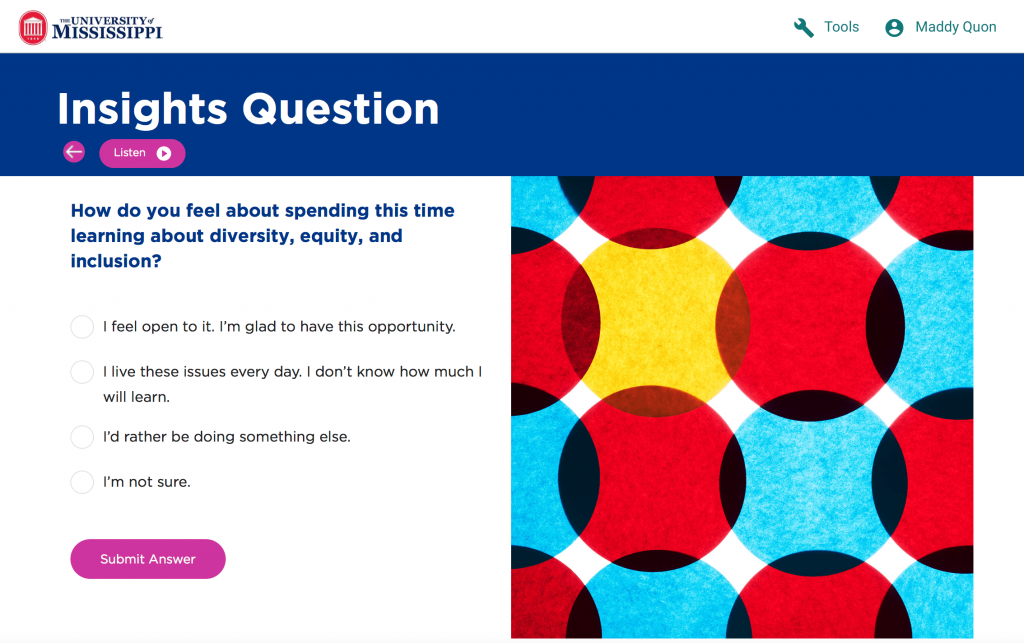
A new mandate from the university requires that every student must take a diversity and inclusion training course, and not doing so could jeopardize a student’s ability to register for classes for the next semester.
This campus-wide requirement to participate in the training was proposed by Provost Noel Wilkin and Vice Chancellor for Diversity and Community Engagement Katrina Caldwell after a picture emerged of university students in front of a bullet-riddled Emmett Till memorial and the murder of Ole Miss student Ally Kostial.
The Council of Academic Administrators, which includes deans, faculty and students, voted on and approved the required training
Several years ago, the University of Mississippi partnered with EVERFI to distribute mandatory training to students with hopes of fostering a healthy and safe college environment. After using the organization’s alcohol and sexual assault training courses, the university is now mandating that every student complete the organization’s diversity and inclusion training.
According to Shawnboda Mead, the assistant vice chancellor for diversity, the university viewed this as an opportunity to ensure that each student was able to have engagement with these topics in alignment with the university’s values of creating and supporting an inclusive campus environment for all.
“This ensures that every student is able to start from a similar place, so when they are having deeper conversations on inclusion and mutual respect in their academic courses or their future careers, they will be able to respond with confidence and familiarity,” Mead said.
On Jan. 31, Wilkin and Caldwell sent a campus-wide email outlining the requirements for the diversity training and offered what they hoped students would learn from the training.
“We believe that learning to navigate and foster a diverse and inclusive environment is an important skill for your personal and professional growth,” the email said.
It is a requirement for all students to complete the training by April 1, and incompletion can potentially impact different processes, such as course registration according to Mead. Other details on the consequences of incompletion remain unclear.
The online course takes roughly 45 minutes to complete and includes a variety of different modules, ranging from personal survey questions to quizzes.
Quiz questions ask respondents to define terms such as diversity and “intersectionality,” and testimonial videos provide users with real-life examples of bias.
Last fall, over 3,000 students completed the online diversity training for either their EDHE course or participation in Greek recruitment.
Currently, the university is exploring ways to promote completion of the training with value-based messaging.
“We live in a diverse world, and our graduates will work in diverse environments,” Mead said. “It is certainly our hope that students appreciate the value of this information and its congruence with being a student at the University of Mississippi.”
EVERFI is an organization whose mission is to maximize digital learning by connecting education to the real world, according to their website.
Still, there are questions about the efficacy of diversity training in changing behaviors. One study by the Harvard Business Review found that the training did little to affect the behaviors of white or male employees, though other groups did experience some changes.
In addition to having access to trainings such as AlcoholEdu, Sexual Assault Awareness for students and Title IX for faculty and staff, the university also partnered with the organization to begin offering Diversity, Equity and Inclusion online training.
Junior Cade Slaughter, a public policy leadership major, has already done the required diversity training because he wanted to see what it entailed. He believes that the university should try to make every student on campus more open-minded and empathetic when it comes to diversity.
“No college campus is without its walls of separation, and Ole Miss is no exception to this. I certainly believe the intended outcome is to weaken some of these persistent walls of separation through the tool of education,” Slaughter said.
However, Slaughter thinks that for the most part, the only reason people will complete it is because it’s required.
“Allowing this diversity and inclusion training to become a more solidified part of our campus culture is certainly possible, but I think it is only possible if students are further incentivized to complete the training,” Slaughter said. “The alcohol awareness training that is mandated at orientation is successful in their completion because it is mandatory. I consider this training to be just as significant and essential to the Ole Miss experience as other mandated online training.”



























